Construction Practice: Legal and Ethical Requirements for Engineers
VerifiedAdded on 2020/02/03
|5
|878
|209
Report
AI Summary
This report delves into the legal and ethical frameworks that govern construction practices, emphasizing the responsibilities of professional engineers. It begins by outlining the legal requirements, such as the Code of Conduct, which protects the titles and actions of engineers, and their obligations towards the environment and public safety. The report then explores the ethical conduct expected of engineers, referencing the Professional Institute Statement of Ethical Principles, which includes accuracy and rigor, honesty and integrity, respect for life, law, and the public good, and responsible leadership. The conclusion summarizes the importance of these frameworks in minimizing the adverse impacts of construction activities on communities and the environment, supported by references to relevant books, journals, and online resources. This analysis is crucial for understanding the ethical dimensions of construction and ensuring responsible engineering practices.
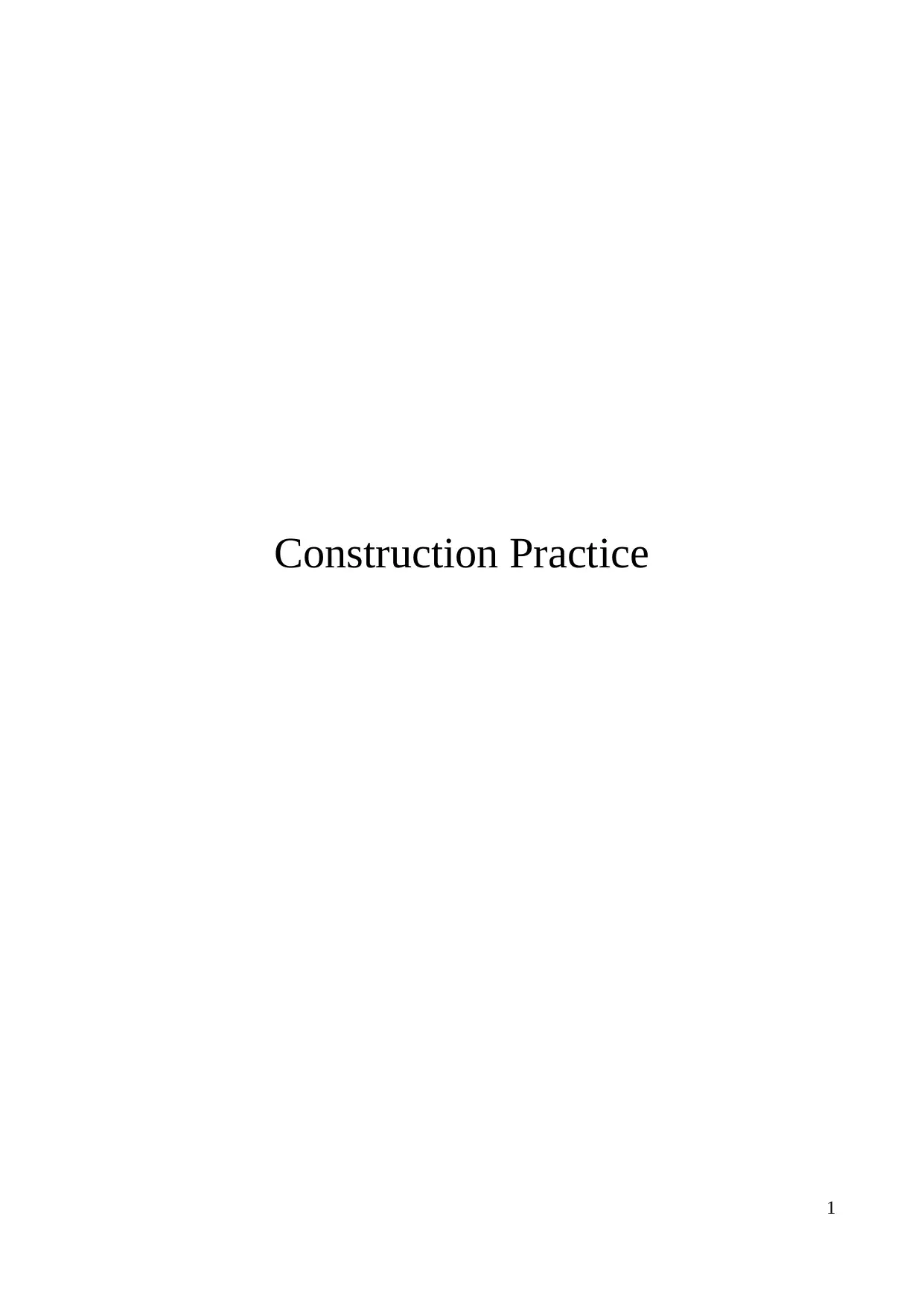
Construction Practice
1
1
Paraphrase This Document
Need a fresh take? Get an instant paraphrase of this document with our AI Paraphraser
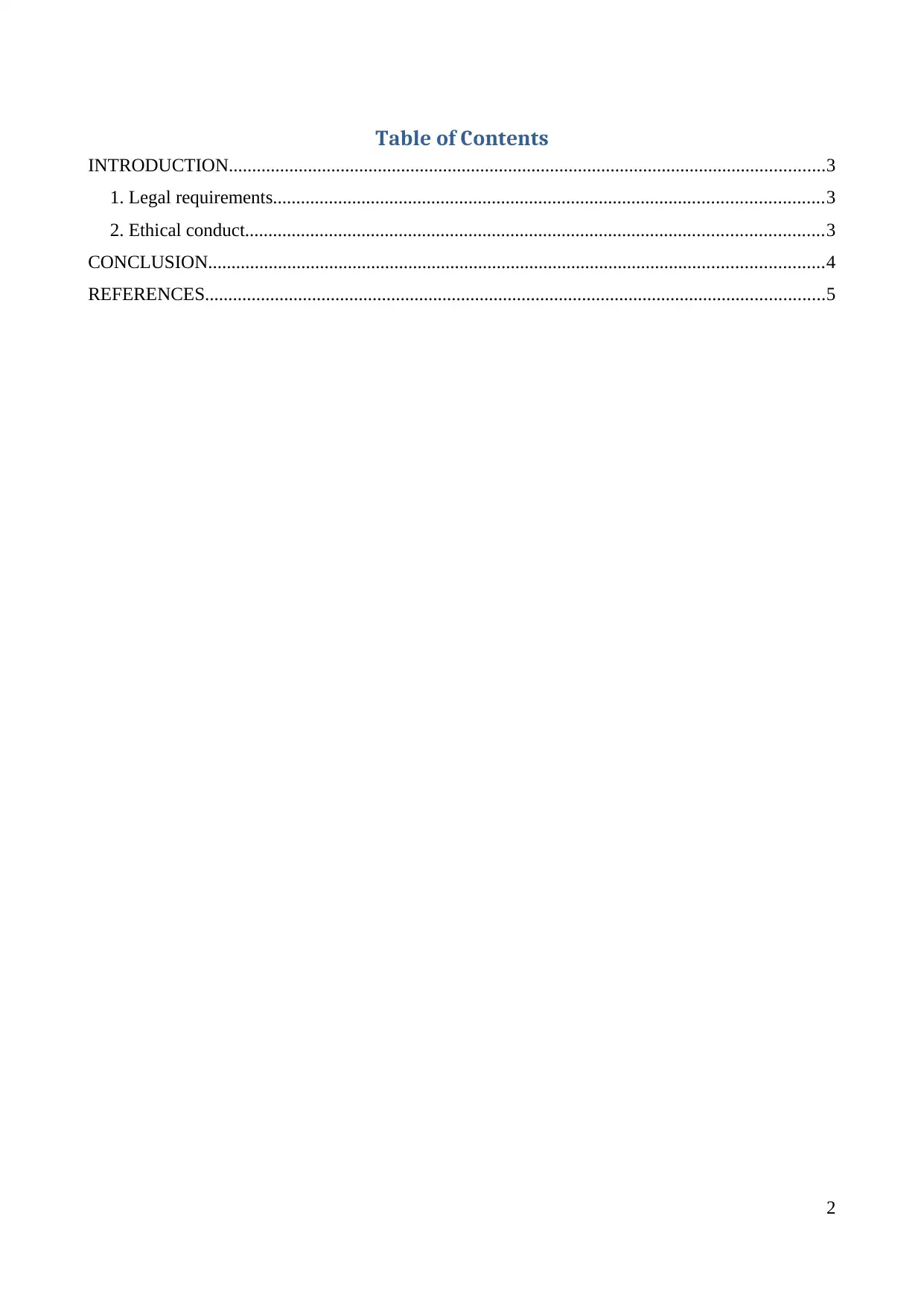
Table of Contents
INTRODUCTION................................................................................................................................3
1. Legal requirements......................................................................................................................3
2. Ethical conduct............................................................................................................................3
CONCLUSION....................................................................................................................................4
REFERENCES.....................................................................................................................................5
2
INTRODUCTION................................................................................................................................3
1. Legal requirements......................................................................................................................3
2. Ethical conduct............................................................................................................................3
CONCLUSION....................................................................................................................................4
REFERENCES.....................................................................................................................................5
2
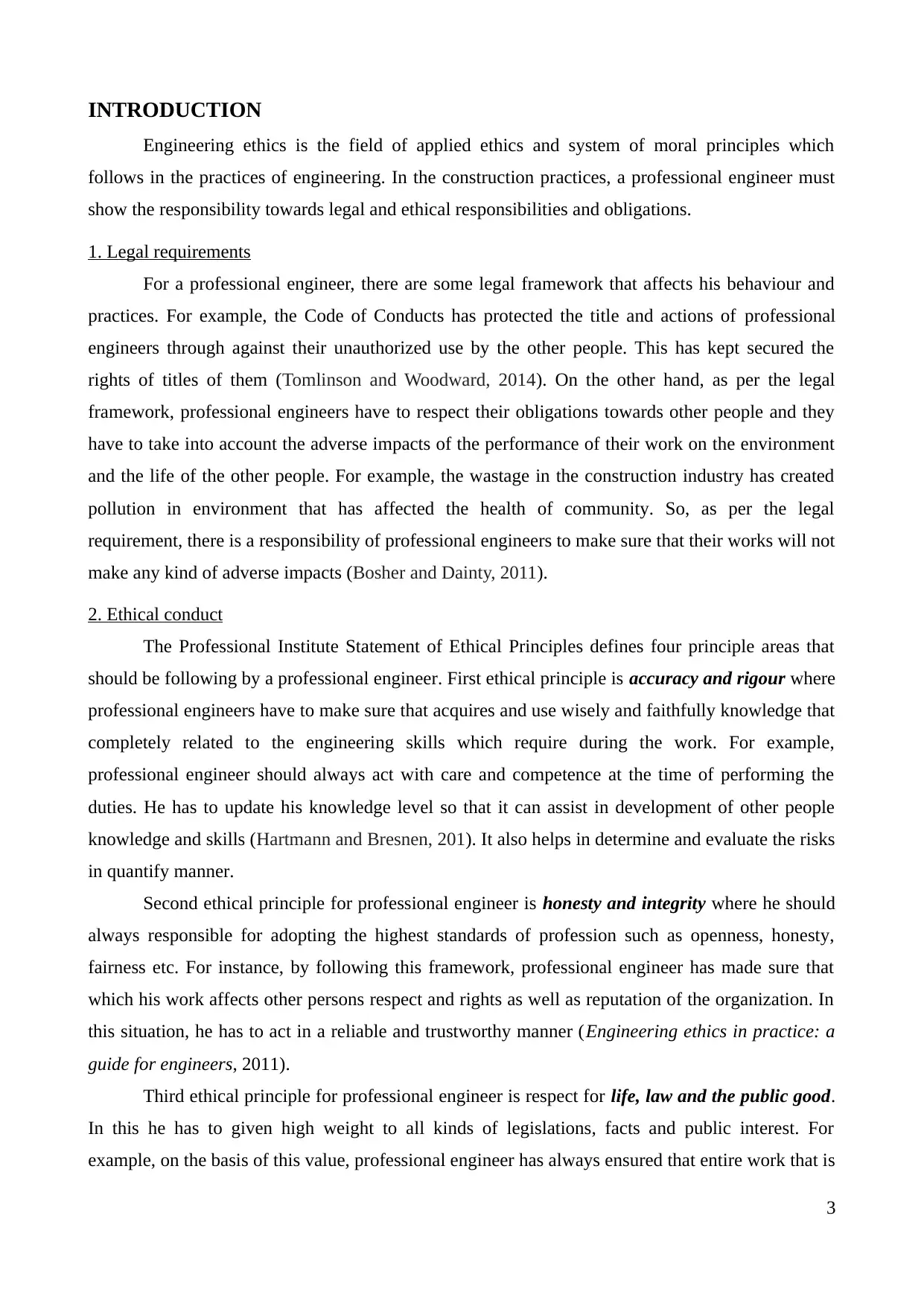
INTRODUCTION
Engineering ethics is the field of applied ethics and system of moral principles which
follows in the practices of engineering. In the construction practices, a professional engineer must
show the responsibility towards legal and ethical responsibilities and obligations.
1. Legal requirements
For a professional engineer, there are some legal framework that affects his behaviour and
practices. For example, the Code of Conducts has protected the title and actions of professional
engineers through against their unauthorized use by the other people. This has kept secured the
rights of titles of them (Tomlinson and Woodward, 2014). On the other hand, as per the legal
framework, professional engineers have to respect their obligations towards other people and they
have to take into account the adverse impacts of the performance of their work on the environment
and the life of the other people. For example, the wastage in the construction industry has created
pollution in environment that has affected the health of community. So, as per the legal
requirement, there is a responsibility of professional engineers to make sure that their works will not
make any kind of adverse impacts (Bosher and Dainty, 2011).
2. Ethical conduct
The Professional Institute Statement of Ethical Principles defines four principle areas that
should be following by a professional engineer. First ethical principle is accuracy and rigour where
professional engineers have to make sure that acquires and use wisely and faithfully knowledge that
completely related to the engineering skills which require during the work. For example,
professional engineer should always act with care and competence at the time of performing the
duties. He has to update his knowledge level so that it can assist in development of other people
knowledge and skills (Hartmann and Bresnen, 201). It also helps in determine and evaluate the risks
in quantify manner.
Second ethical principle for professional engineer is honesty and integrity where he should
always responsible for adopting the highest standards of profession such as openness, honesty,
fairness etc. For instance, by following this framework, professional engineer has made sure that
which his work affects other persons respect and rights as well as reputation of the organization. In
this situation, he has to act in a reliable and trustworthy manner (Engineering ethics in practice: a
guide for engineers, 2011).
Third ethical principle for professional engineer is respect for life, law and the public good.
In this he has to given high weight to all kinds of legislations, facts and public interest. For
example, on the basis of this value, professional engineer has always ensured that entire work that is
3
Engineering ethics is the field of applied ethics and system of moral principles which
follows in the practices of engineering. In the construction practices, a professional engineer must
show the responsibility towards legal and ethical responsibilities and obligations.
1. Legal requirements
For a professional engineer, there are some legal framework that affects his behaviour and
practices. For example, the Code of Conducts has protected the title and actions of professional
engineers through against their unauthorized use by the other people. This has kept secured the
rights of titles of them (Tomlinson and Woodward, 2014). On the other hand, as per the legal
framework, professional engineers have to respect their obligations towards other people and they
have to take into account the adverse impacts of the performance of their work on the environment
and the life of the other people. For example, the wastage in the construction industry has created
pollution in environment that has affected the health of community. So, as per the legal
requirement, there is a responsibility of professional engineers to make sure that their works will not
make any kind of adverse impacts (Bosher and Dainty, 2011).
2. Ethical conduct
The Professional Institute Statement of Ethical Principles defines four principle areas that
should be following by a professional engineer. First ethical principle is accuracy and rigour where
professional engineers have to make sure that acquires and use wisely and faithfully knowledge that
completely related to the engineering skills which require during the work. For example,
professional engineer should always act with care and competence at the time of performing the
duties. He has to update his knowledge level so that it can assist in development of other people
knowledge and skills (Hartmann and Bresnen, 201). It also helps in determine and evaluate the risks
in quantify manner.
Second ethical principle for professional engineer is honesty and integrity where he should
always responsible for adopting the highest standards of profession such as openness, honesty,
fairness etc. For instance, by following this framework, professional engineer has made sure that
which his work affects other persons respect and rights as well as reputation of the organization. In
this situation, he has to act in a reliable and trustworthy manner (Engineering ethics in practice: a
guide for engineers, 2011).
Third ethical principle for professional engineer is respect for life, law and the public good.
In this he has to given high weight to all kinds of legislations, facts and public interest. For
example, on the basis of this value, professional engineer has always ensured that entire work that is
3
⊘ This is a preview!⊘
Do you want full access?
Subscribe today to unlock all pages.

Trusted by 1+ million students worldwide
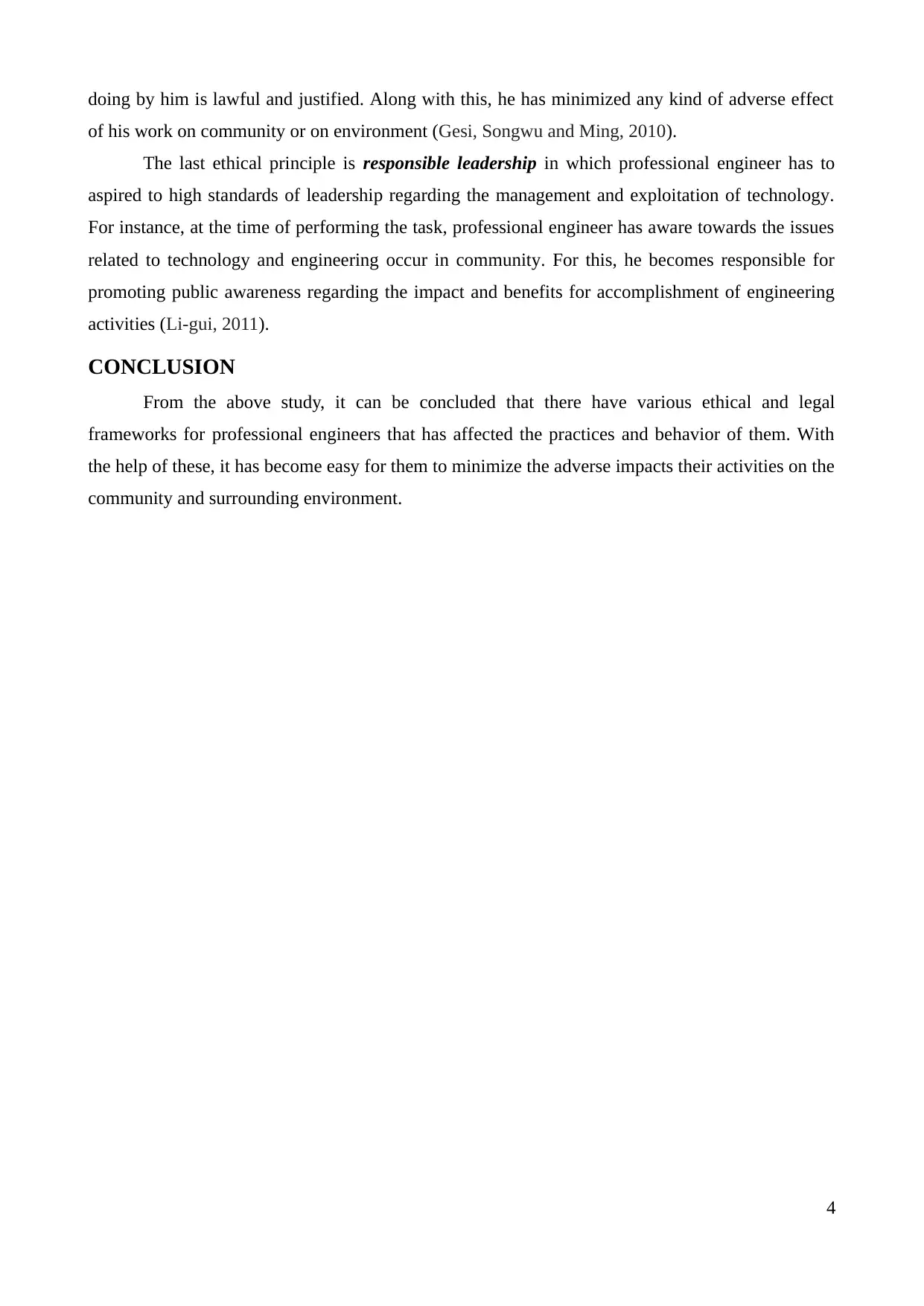
doing by him is lawful and justified. Along with this, he has minimized any kind of adverse effect
of his work on community or on environment (Gesi, Songwu and Ming, 2010).
The last ethical principle is responsible leadership in which professional engineer has to
aspired to high standards of leadership regarding the management and exploitation of technology.
For instance, at the time of performing the task, professional engineer has aware towards the issues
related to technology and engineering occur in community. For this, he becomes responsible for
promoting public awareness regarding the impact and benefits for accomplishment of engineering
activities (Li-gui, 2011).
CONCLUSION
From the above study, it can be concluded that there have various ethical and legal
frameworks for professional engineers that has affected the practices and behavior of them. With
the help of these, it has become easy for them to minimize the adverse impacts their activities on the
community and surrounding environment.
4
of his work on community or on environment (Gesi, Songwu and Ming, 2010).
The last ethical principle is responsible leadership in which professional engineer has to
aspired to high standards of leadership regarding the management and exploitation of technology.
For instance, at the time of performing the task, professional engineer has aware towards the issues
related to technology and engineering occur in community. For this, he becomes responsible for
promoting public awareness regarding the impact and benefits for accomplishment of engineering
activities (Li-gui, 2011).
CONCLUSION
From the above study, it can be concluded that there have various ethical and legal
frameworks for professional engineers that has affected the practices and behavior of them. With
the help of these, it has become easy for them to minimize the adverse impacts their activities on the
community and surrounding environment.
4
Paraphrase This Document
Need a fresh take? Get an instant paraphrase of this document with our AI Paraphraser
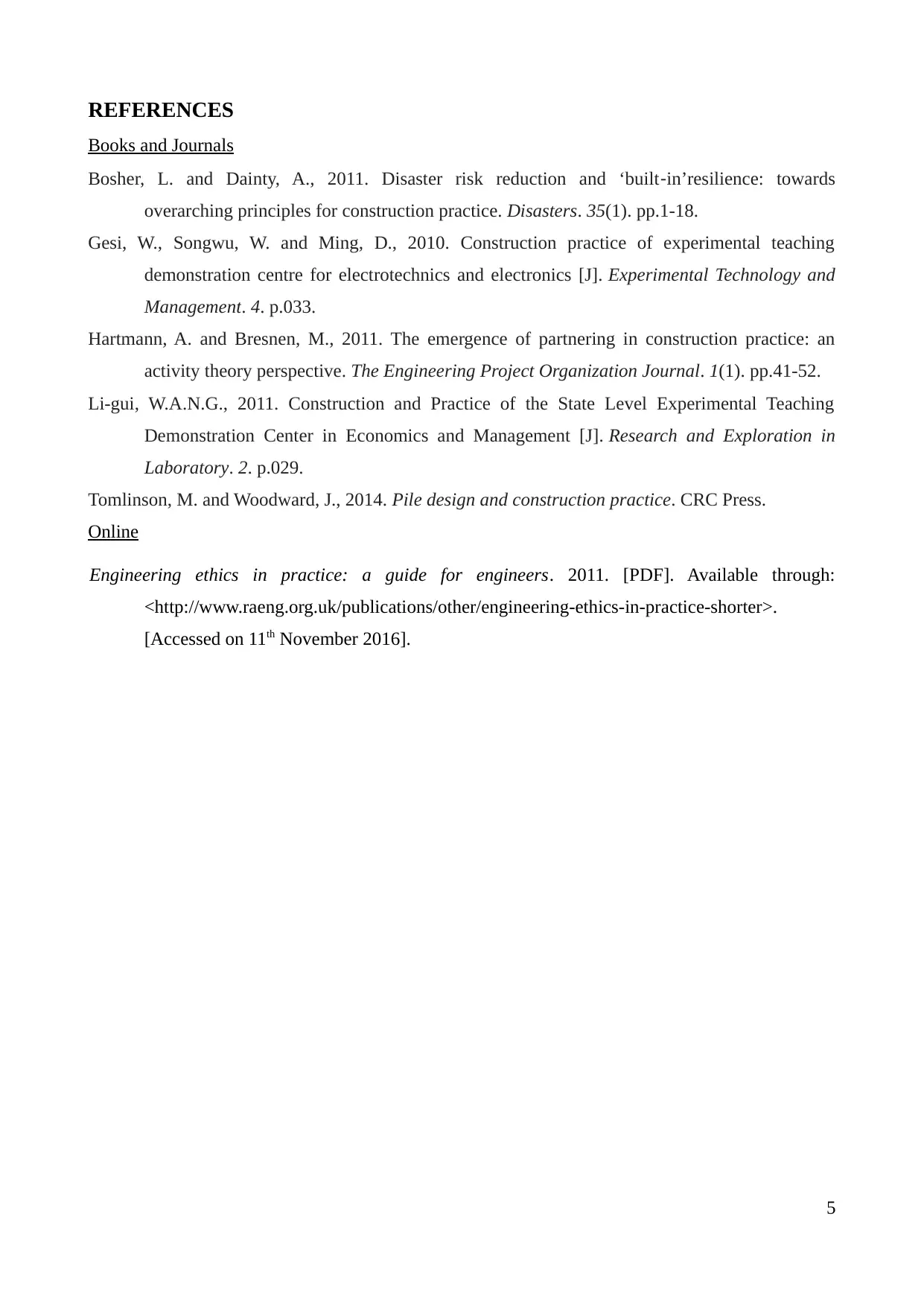
REFERENCES
Books and Journals
Bosher, L. and Dainty, A., 2011. Disaster risk reduction and ‘built‐in’resilience: towards
overarching principles for construction practice. Disasters. 35(1). pp.1-18.
Gesi, W., Songwu, W. and Ming, D., 2010. Construction practice of experimental teaching
demonstration centre for electrotechnics and electronics [J]. Experimental Technology and
Management. 4. p.033.
Hartmann, A. and Bresnen, M., 2011. The emergence of partnering in construction practice: an
activity theory perspective. The Engineering Project Organization Journal. 1(1). pp.41-52.
Li-gui, W.A.N.G., 2011. Construction and Practice of the State Level Experimental Teaching
Demonstration Center in Economics and Management [J]. Research and Exploration in
Laboratory. 2. p.029.
Tomlinson, M. and Woodward, J., 2014. Pile design and construction practice. CRC Press.
Online
Engineering ethics in practice: a guide for engineers. 2011. [PDF]. Available through:
<http://www.raeng.org.uk/publications/other/engineering-ethics-in-practice-shorter>.
[Accessed on 11th November 2016].
5
Books and Journals
Bosher, L. and Dainty, A., 2011. Disaster risk reduction and ‘built‐in’resilience: towards
overarching principles for construction practice. Disasters. 35(1). pp.1-18.
Gesi, W., Songwu, W. and Ming, D., 2010. Construction practice of experimental teaching
demonstration centre for electrotechnics and electronics [J]. Experimental Technology and
Management. 4. p.033.
Hartmann, A. and Bresnen, M., 2011. The emergence of partnering in construction practice: an
activity theory perspective. The Engineering Project Organization Journal. 1(1). pp.41-52.
Li-gui, W.A.N.G., 2011. Construction and Practice of the State Level Experimental Teaching
Demonstration Center in Economics and Management [J]. Research and Exploration in
Laboratory. 2. p.029.
Tomlinson, M. and Woodward, J., 2014. Pile design and construction practice. CRC Press.
Online
Engineering ethics in practice: a guide for engineers. 2011. [PDF]. Available through:
<http://www.raeng.org.uk/publications/other/engineering-ethics-in-practice-shorter>.
[Accessed on 11th November 2016].
5
1 out of 5
Related Documents
Your All-in-One AI-Powered Toolkit for Academic Success.
+13062052269
info@desklib.com
Available 24*7 on WhatsApp / Email
![[object Object]](/_next/static/media/star-bottom.7253800d.svg)
Unlock your academic potential
Copyright © 2020–2026 A2Z Services. All Rights Reserved. Developed and managed by ZUCOL.




